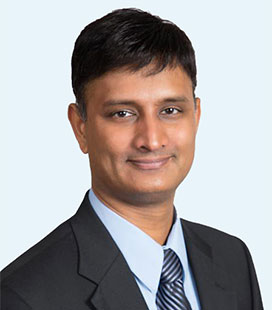
Srikant Kondapaneni, MD, chief of pulmonary medicine at Englewood Health
Lung cancer is the leading cause of cancer death among American men and women, with a new diagnosis handed down every two and a half minutes. That’s the bad news. The good news is that lung cancer is also one of the most preventable cancers. While other cancers are principally the result of genetic predisposition, the main causes of lung cancer are well known and controllable.
The guidelines for preventing lung cancer are: don’t smoke, avoid indoor pollutants (second-hand smoke, radon gas, and asbestos fibers), and limit your exposure to the mixture of air pollutants we call smog. These, in addition to regular exercise and healthcare, are also the basic rules for general lung health and for preventing other respiratory conditions, such as chronic obstructive pulmonary disease (COPD) and interstitial lung disease.
What are the symptoms of lung cancer?
Dr. Kondapaneni: Symptoms include coughing, blood-streaked mucus, wheezing, chest pain, shortness of breath, and fatigue. It’s important to note that symptoms typically present in the later stages, when treatment may be less effective. That’s why, for those for whom it is appropriate, being screened before symptoms appear is important.
Why is it important for pulmonary patients to see a doctor locally?
Dr. Kondapaneni: Being able to obtain treatment locally is crucial, as many pulmonary conditions can make travel extremely taxing. For anyone with a breathing disorder, a two- or three-hour round trip to New York City can be exhausting. That’s why having a pulmonary team at Englewood Health is so beneficial to patients in the area.
What other pulmonary conditions do you treat at Englewood Health?
Dr. Kondapaneni: I get a lot of patients with poorly controlled asthma. Management usually includes prescriptions for inhalers, but we also offer IV infusion therapy and bronchial thermoplasty.
For COPD, we provide pulmonary rehabilitation, in which a team of specialists guides the patient toward optimal pulmonary health and fitness. The program includes guided training sessions on breath control, coughing, and airway clearance. We also educate the patient on how to manage symptoms through nutrition and hydration.
Who is the typical candidate for lung cancer screenings?
Dr. Kondapaneni: The typical candidate is between 55 and 74 years old and has smoked at least a pack a day for 30 years, or the equivalent, and either is currently smoking or quit during the past 15 years.
Posted November 2018

Srikant Kondapaneni, MD, chief of pulmonary medicine at Englewood Health
